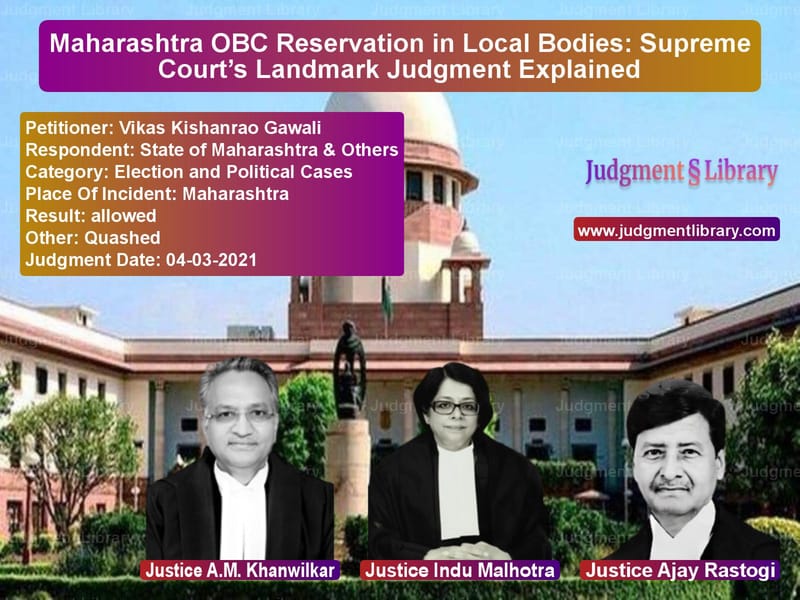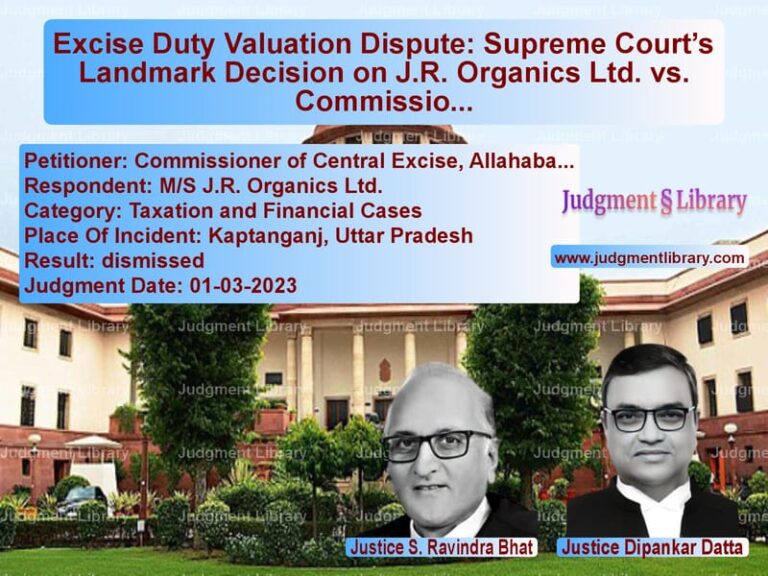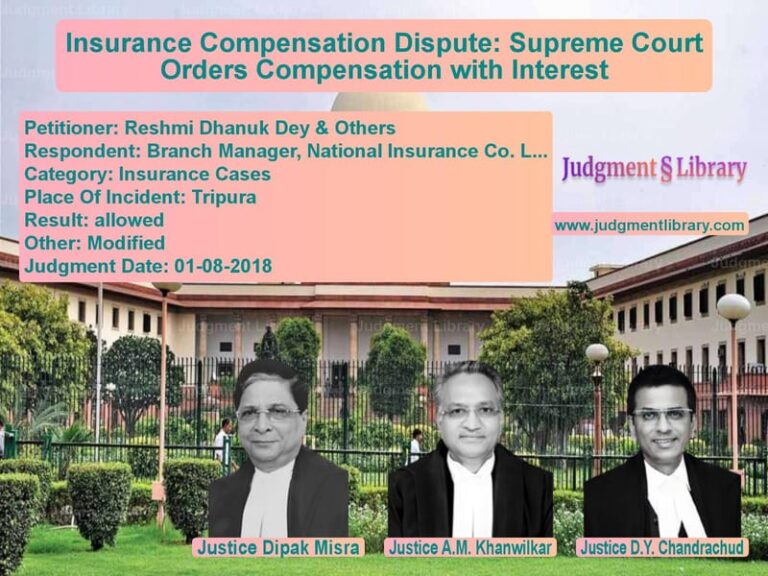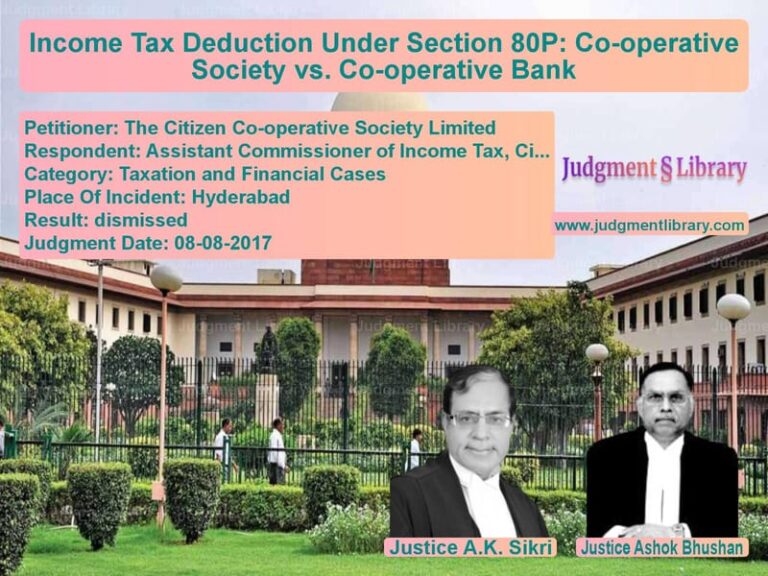Maharashtra OBC Reservation in Local Bodies: Supreme Court’s Landmark Judgment Explained
The Supreme Court of India delivered a significant judgment concerning the reservation of seats for Other Backward Classes (OBCs) in local bodies in Maharashtra. The case revolved around the legality of exceeding the 50% reservation cap in local self-government institutions such as Zilla Parishads and Panchayat Samitis. The petitioners, led by Vikas Kishanrao Gawali, challenged the State of Maharashtra’s notifications, arguing that they violated constitutional provisions and previous Supreme Court rulings. The Court’s verdict reaffirmed the constitutional ceiling on reservations and laid down strict criteria for granting OBC reservations in local elections.
Background of the Case
The dispute arose from the Maharashtra government’s decision to reserve seats in local bodies for OBCs beyond the 50% cap set by the Supreme Court in previous rulings. Section 12(2)(c) of the Maharashtra Zilla Parishads and Panchayat Samitis Act, 1961, provided for a 27% reservation for OBCs. However, in combination with reservations for Scheduled Castes (SCs) and Scheduled Tribes (STs), the total reservations in some districts exceeded 50% of the total seats. The petitioners challenged the constitutionality of these provisions and sought their quashing.
Read also: https://judgmentlibrary.com/sarpanch-no-confidence-motion-supreme-court-reinstates-collectors-order/
The case was filed under Article 32 of the Indian Constitution, which grants individuals the right to move the Supreme Court in case of violations of fundamental rights. The petitioners contended that the excessive reservation violated the principle of equality enshrined in Articles 14 and 16 of the Constitution.
Petitioners’ Arguments
- The petitioners argued that the Supreme Court’s Constitution Bench ruling in K. Krishna Murthy v. Union of India had explicitly held that total reservations in local bodies should not exceed 50%.
- They contended that the Maharashtra government had failed to conduct an empirical study to justify the additional reservation for OBCs.
- The uniform 27% reservation for OBCs across all local bodies was arbitrary and lacked any basis in contemporary data.
- The petitioners emphasized that granting reservations beyond the 50% threshold would set a dangerous precedent, leading to excessive reservations in other states.
Respondents’ Arguments
- The State of Maharashtra defended its decision, arguing that exceptional circumstances warranted exceeding the 50% cap.
- It claimed that the reservation was necessary to ensure adequate political representation for OBCs in local governance.
- The government asserted that it had acted within its constitutional powers under Article 243-D and 243-T, which allow for reservations in local bodies.
- The state also contended that the 27% OBC reservation had been in place for decades and should not be disturbed.
Supreme Court’s Observations
Justice A.M. Khanwilkar, delivering the judgment, emphasized that the Constitution Bench’s ruling in K. Krishna Murthy was binding. The Court reiterated that reservations for OBCs in local bodies were statutory and not constitutional, unlike those for SCs and STs. The judgment made the following key observations:
- The 50% ceiling on total reservations is sacrosanct and cannot be breached, except in Scheduled Areas where ST reservations might be higher.
- Before granting OBC reservations, states must fulfill a triple-test requirement:
- Establishment of a dedicated commission to conduct empirical research on the political backwardness of OBCs.
- Specification of reservation quotas based on empirical data at the local body level.
- Ensuring that the total reservation does not exceed 50%.
- The Court found that the Maharashtra government had failed to conduct an empirical study before fixing the 27% OBC reservation.
- It ruled that merely relying on past data or arbitrary quotas was not permissible under the Constitution.
Court’s Verdict
The Supreme Court ruled that Maharashtra’s notifications providing OBC reservations beyond the 50% limit were unconstitutional. It quashed these notifications and declared all elections conducted under the unconstitutional reservation framework as void. The Court ordered fresh elections for the affected seats, allowing only general category candidates to contest.
“The reservation for OBCs must be proportionate to their political backwardness, determined through a rigorous empirical study by a dedicated commission.”
The Court further directed the Maharashtra government to set up a dedicated commission to conduct a detailed study on the need for OBC reservations in local bodies. The commission would then recommend an appropriate reservation percentage, ensuring that the total reservation remains within the 50% limit.
Impact of the Judgment
- The judgment reaffirmed the Supreme Court’s earlier rulings that total reservations cannot exceed 50% without exceptional justifications.
- It nullified the results of local body elections held under the unconstitutional reservation framework.
- The ruling set a precedent that OBC reservations must be backed by empirical data, not political considerations.
- The State Election Commission was instructed to conduct fresh elections for the affected seats.
Conclusion
The Supreme Court’s judgment in this case is a landmark ruling that reinforces the constitutional principle that reservations must be within prescribed limits. It underscores the need for empirical studies before implementing OBC reservations in local self-government institutions. The ruling is expected to influence similar cases in other states and ensure that reservation policies align with constitutional mandates.
By upholding the 50% ceiling, the Court has ensured that social justice measures do not infringe upon the fundamental right to equality. The Maharashtra government must now take corrective measures and conduct a comprehensive study before proposing any new reservation framework for OBCs in local bodies.
Petitioner Name: Vikas Kishanrao Gawali.Respondent Name: State of Maharashtra & Others.Judgment By: Justice A.M. Khanwilkar, Justice Indu Malhotra, Justice Ajay Rastogi.Place Of Incident: Maharashtra.Judgment Date: 04-03-2021.
Don’t miss out on the full details! Download the complete judgment in PDF format below and gain valuable insights instantly!
Download Judgment: vikas-kishanrao-gawa-vs-state-of-maharashtra-supreme-court-of-india-judgment-dated-04-03-2021.pdf
Directly Download Judgment: Directly download this Judgment
See all petitions in Fundamental Rights
See all petitions in Constitution Interpretation
See all petitions in Legislative Powers
See all petitions in Public Interest Litigation
See all petitions in Judgment by A M Khanwilkar
See all petitions in Judgment by Indu Malhotra
See all petitions in Judgment by Ajay Rastogi
See all petitions in allowed
See all petitions in Quashed
See all petitions in supreme court of India judgments March 2021
See all petitions in 2021 judgments
See all posts in Election and Political Cases Category
See all allowed petitions in Election and Political Cases Category
See all Dismissed petitions in Election and Political Cases Category
See all partially allowed petitions in Election and Political Cases Category







